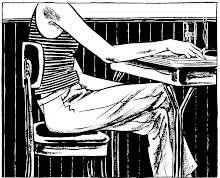Class #7
Tonight's class was very disorganized, though I had thought before tonight that it wasn't going to be. The problems were that I didn't have the right materials (i.e. pictures) to show what I wanted to about artists and artworks we were to cover. Also, when going over a handout on design elements I pretty much choked because it felt silly to try to talk about design without having concrete examples to point to. And once that thought entered my head, I lost it/couldn't think of a way to continue so ended up rambling.
It is too easy for me to get frustrated. I know I need to use this to learn something and grow and all these good things. But I HATE the idea that I am wasting their time (and mine) by holding a fluffy class. Hindsight being 20/20, I should have made some of the fluffier classes more information-based (with lecture, handouts, and esp. hands-on activity)
adelante: more constructive criticisms
-t-a-l-k s-l-o-w-e-r. i recorded my thoughts on tape tonight, and am amazed at how incredibly fast I talk (even though people often tell me this, and I really have been trying to fix it). daaamn it's worse than i ever thought. could have done this earlier. will probably do it again to monitor progress.
-make sure the last classes are very well organized, and informative (but not rushed).
-don’t get lost in frustration, but accept the f*-ups and move on by making changes.
on the upside-gave them nice art paper tonight, and expect to get something from almost all if not all of them for the zine.
-working on being able to give them drawing pencils, and have asked Ms. Perry if there is a slide projector to use for images.
-question: can i hold my two last classes, but add another session the following week (april 18) to give them copies of the zine and have a closing discussion? I feel I owe it to them.
-a bug was put in my ear about getting the guys certificates for participating in the class. want to do that
on agenda for next week:
1. essay on the book we read (pulling ideas together)
2. overviews of modernism and postmodernism? (need to find good readings on this, because I'm having trouble gleaning simple information on these huge concepts)
3. review/critique piecies for the zine
4. discuss article i gave out this week
It is too easy for me to get frustrated. I know I need to use this to learn something and grow and all these good things. But I HATE the idea that I am wasting their time (and mine) by holding a fluffy class. Hindsight being 20/20, I should have made some of the fluffier classes more information-based (with lecture, handouts, and esp. hands-on activity)
adelante: more constructive criticisms
-t-a-l-k s-l-o-w-e-r. i recorded my thoughts on tape tonight, and am amazed at how incredibly fast I talk (even though people often tell me this, and I really have been trying to fix it). daaamn it's worse than i ever thought. could have done this earlier. will probably do it again to monitor progress.
-make sure the last classes are very well organized, and informative (but not rushed).
-don’t get lost in frustration, but accept the f*-ups and move on by making changes.
on the upside-gave them nice art paper tonight, and expect to get something from almost all if not all of them for the zine.
-working on being able to give them drawing pencils, and have asked Ms. Perry if there is a slide projector to use for images.
-question: can i hold my two last classes, but add another session the following week (april 18) to give them copies of the zine and have a closing discussion? I feel I owe it to them.
-a bug was put in my ear about getting the guys certificates for participating in the class. want to do that
on agenda for next week:
1. essay on the book we read (pulling ideas together)
2. overviews of modernism and postmodernism? (need to find good readings on this, because I'm having trouble gleaning simple information on these huge concepts)
3. review/critique piecies for the zine
4. discuss article i gave out this week

